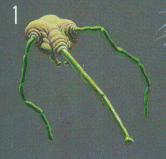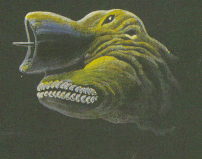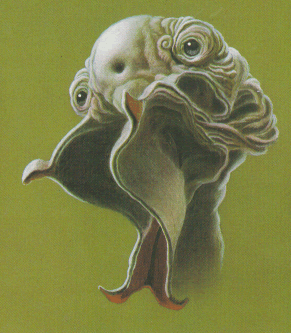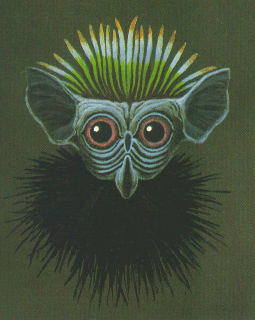| Home | class
topics grading rules |
resources links reading |
contacts feedback office hours |
intelligence and: |

|

|

|
 |
 |
 |
Recognizing nonhuman Intelligence
on Earth, elsewhere
questions & assignment
Contacting an alien intelligence will be one of the peak experiences
of the human species, right up there with inventing language.
But what are our chances of actually recognizing an alien intelligence for what it is? What if it does not say "Take me to your leader" from an obviously technologically superior spaceship?
Recognizing intelligence on Earth
The human track record of recognizing intelligence in unexpected places is not good. A few centuries ago when the Europeans first sailed along the coast of Africa, they did not recognize the Africans as belonging to the same species or as intelligent beings. I do not know if there is a record of how the Africans felt about the whites, but a common reaction reported about people who have never seen whites is to assume the bleached skin is a sign of disease or of being a demon. This implies a similar lack of recognition of common humanity. Assuming the Europeans are typical of our ability to recognize intelligence, we humans have flunked the easiest possible test.
Recognizing the significantly different intelligences we find in animals is more problematic. On one hand, there is resistance to accepting evidence of higher intelligence. Sometimes near-absurd levels of proof are required. A chimpanzee may clearly recognize itself in a mirror or use sign language to indicate that a banana would be welcome, yet there are people who argue that this is not evidence of self-awareness or an attempt to get the researcher to do something but is simply a learned response like a dog salivating on hearing a bell that always rings at meal times. It may be that extraordinary claims require extraordinary proof, but there are limits. Sometimes I am reminded of the cartoon where Dilbert is trying to establish his ID to the Sceptics Association, but he cannot prove that his identity has not been faked. He finally suggests a DNA test, and winds up protesting, "No, I can't prove I haven't been cloned!"
On the other hand, there is the problem of reading far more intelligence into animals than they possess. All of us pet owners who talk in sentences to our animals are guilty of this. It is harmless with pets, but could cause problems in other situations.
Recognizing Intelligence Elsewhere
I've tried in the various pages on this site to indicate how and where intelligence is likeliest to develop, given the evolutionary pressures that would logically be operating. The result is that the likeliest form for a highly intelligent animal is bilaterally symmetrical, with a head and something like hands, with child-like characteristics, living in social groups, and living on land. Humans, in short. Either I have fallen into the common error of believing that the conditions obtaining on Earth must be universal, or this is a true insight into what we can expect. If so, aliens may be a lot less alien in many ways than science fiction has led us to expect. If, in addition, these weirdly familiar aliens use spoken language we may have almost no trouble recognzing them as intelligent beings.
The main thing is to be aware of our assumptions and biases, then they can be counteracted and our chances of success in the real world increase. Our biases with respect to intelligence are first and foremost that the creature will be language- and tool-using. We also tend to expect it to be social and neotenous. If the assumptions about evolutionary pressures presented on this site are right, then we may be quite justified in these biases. But then again, we may not.
 |
 |
 |
 |
|
Which of these faces would we be likeliest to recognize as intelligent, and why? (All from Dickinson and Schaller) |
|||
Furthermore, what happens once intelligence has evolved so far that it frees itself from its historical constraints? Abstract cognition may not easily evolve under water or floating on air, but an intelligent being could move into that environment. Gas clouds in space have no reason to develop intelligence, but creatures who developed "normally" might ultimately decide they would prefer to float free among the stars. And we might find them there if we were capable of recognizing them.
Questions/Assignment
See question associated with the graphic of four faces above.
Assignment: Stanley Weinbaum's "A Martian Odyssey" was first published in 1934 and was one of the first depictions of aliens as people rather than bug-eyed monsters. Note which events cause the human to start realizing that the Martian, Tweel, is sapient. At the end, are the most important factors between these two beings cognitive, or something else, or both? Repeating a theme from the first unit, what does this say about the importance of intelligence relative to other qualities in defining a creature's status as a person rather than an animal or a thing?